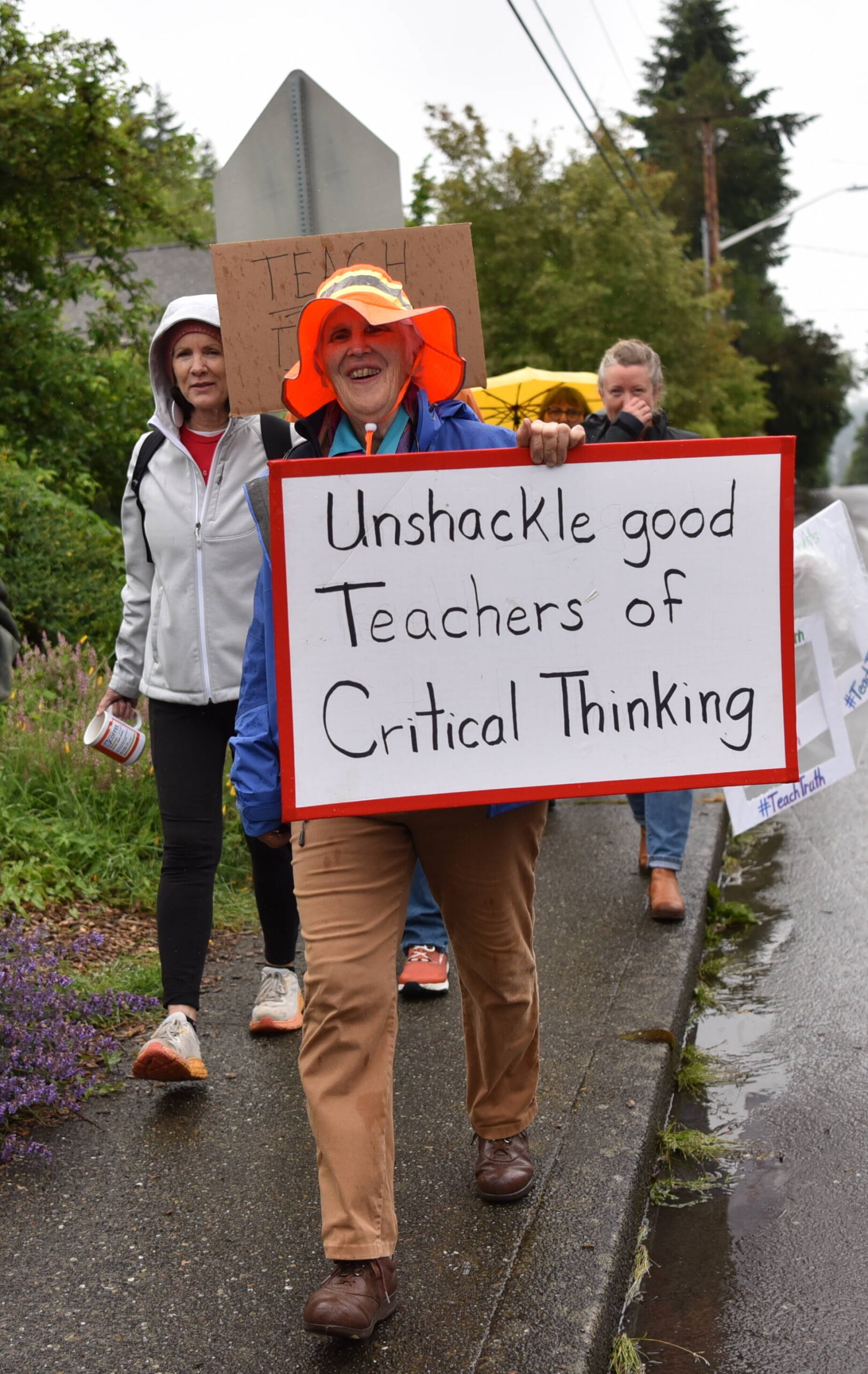Jill Davidson, a trans woman, said she doesn’t understand it.
“I don’t know why parents allow their kids to see horror movies, but won’t let them understand the horrors of history,” Davidson said. “It doesn’t help to say, ‘Oh, slavery happened. That was terrible.’
Davidson was one of many who spoke at a “Freedom to Learn” march and panel discussion June 10 in Winslow to protest book bannings and laws that restrict the teaching of racism, white supremacy and LGBTQIA+ topics in schools.
Davidson, a North Kitsap School District school counselor, said it’s important to tell stories in interesting ways to help people understand.
“I think a lot of the people who are against us is because they don’t know any stories. Where do those come from? We tell them in schools; that’s usually the most common place.”
Davidson said discrimination is still commonplace.
“There are ways that that still lives on. How do we stop it?” Davidson said, adding: “If you’re white, you haven’t had to deal with racism. You probably haven’t had to dig very deeply into history. We have to teach critical race theory in schools because critical race theory is designed to dismantle the effects of slavery and racism. That’s not a bad thing.”
Kimi Kinoshita said those lessons are important because understanding begins with learning about the personal stories and experiences of those who have had to repress their sexual identities to survive and thrive in society.
“If we cannot imagine and feel the pain and suffering of those coerced by the intolerance of the beliefs of our society, then we degrade our humanity. As an antidote, we need to amplify silenced voices, so we can know the truth of other lived experiences,” Kinoshita said.
Kinoshita believes that the truth should be neutral and stand alone on its merit as being the truth. “Why would we want to continue reinforcing lies and half-truths that have led us to the structural racism that undergirds most of our systems in place today? How can we ask our students to recite a pledge that concludes with the phrase ‘with liberty and justice for all?’
“I think we should all actively contribute to reflecting on how we might as a people work towards a more perfect union. No one should be personally ashamed for our country’s past actions, but we can be collectively sad and want to be better because now we know. I believe the truth is our only path forward and our opportunity for redemption.”
Panelist and MAC co-chair Chasity Malatesta said teaching truth is a demonstration of the love she has for her identity and community.
“Bainbridge and Kitsap have stories of marginalized communities that have been launching because of our elders, because of BIJAC, because of the Indipino and because of Akuyea (Karen Vargas). We have platforms that say: ‘We know history, we empower history, and we will not forget our history.’”
Malatesta said that the work can’t always be done by the Bainbridge Island people of color community and called upon informal public leaders to help. “When they (the public) see cis(gender) white males, retired judges and teachers in our community at the pulpit, saying, ‘Fight for our schools, fight for our kids,’ they can’t disassociate, and they realize community is solidarity.”
Educator Jing Fong moderated the “Freedom to Learn: What’s at Stake” panel discussion with questions about teaching truth, even when it may be uncomfortable. Attendees gathered with leaders from the Bainbridge Multicultural Advisory Community, H.E.A.L. Together and the Zinn Education Project and marched from the BI Historical Museum to the public library to raise awareness about laws that ban gender-affirming care for trans-youth and books addressing LGBTQIA+ issues.
Pam Crowe, a librarian, said she learned about the 1969 Stonewall Uprising when she was in her 30s and said teaching accurate history and current events must be referenced. “We must tap into that information. Use it as a resource to continue to keep the fabric of our community together and strong in the way that it should be. There should not be one thread loose from our woven fabric,” Crowe said. “We have to make sure that our children are educated. To know how we are to respect one another, to know how we are to receive one another.”



